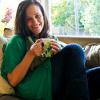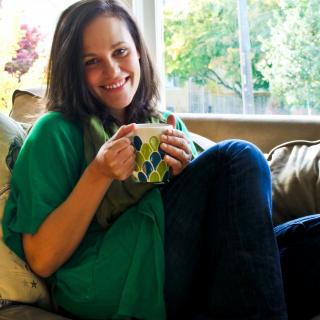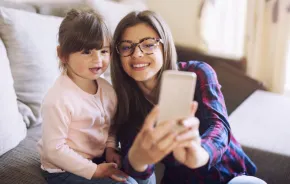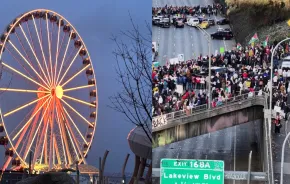
Photo:
Annabelle Falconer, pictured with her mother, Kim Pesik | Credit: Will Austin
When Annabelle Falconer, 16, first heard about the Holocaust Center for Humanity, it was at the family dinner table. Her mother, Kim, a middle school teacher, had visited the center to access educational resources for her classroom. Located in downtown Seattle, the Holocaust Center for Humanity offers events, field trips, museum visits, curriculum materials and community programs, and has been a resource for many area families and educators since 1989.
Falconer visited the center with her mom. Immediately, her interest was piqued, she says. So, when she heard about an opportunity to become a member of the center’s student leadership board, she applied.
It’s now been three years, and Falconer says the lessons she’s learned in her work continue to inspire her. “Every single time I get to share my work or listen to the stories of survivors or hear the lessons of the Holocaust, I feel like I get to continue their legacy.”
Who is your personal hero?
For me, it’s all the survivors that I work with at the center; they really push my drive for what I do with the Holocaust Center and my community. A couple of years ago, I interviewed a survivor named Ingrid whose family helped hide people during the Holocaust. And recently, I met a survivor whose family came to the United States, and she then dedicated her life’s work to helping refugees and spreading the story of the Holocaust.
What do you wish people understood about the work you do through the Holocaust Center for Humanity?
What I hope people can understand from the work that we do is to take lessons from history and apply them to our future. How do we take the experiences of the Holocaust and apply them to issues that are still relevant today? How can we look at the actions that were taken or not taken during the Holocaust and apply that to the injustices that are still prevalent in our society today? That’s the big takeaway that I hope people get from what the Holocaust Center does.
What’s one small action our readers can take in their own lives to make positive change happen?
Even as an individual, you can take small steps to address injustices in our society. Lots of survivors talk about the impact one person had on saving their lives and saving others. Know the power of yourself and your voice and find ways to use that when you see something that isn’t right, and encourage others to do the same with their voice.
What daily habit or small routine is most important to you?
For me, I like to really stay involved with what’s going on in our world. Our family will always have the news on in the mornings and each night.
How do you measure progress in your work?
As we get further from the Holocaust, it’s important to keep survivors’ stories alive. When I get to tell those stories and learn those stories, that has such an impact on my life and others’ lives.
Do you have any advice for today’s parents who want to raise and support socially conscious kids?
Have conversations about what’s going on in the world. What are the issues that they’re seeing? Establish those parallels to what they’re learning in school, seeing on the news and hearing out in the world, and connect that to broader lessons that we should all want to live by.
If you could have a superpower, what would it be?
I would like teleportation powers or maybe even a time machine. There are so many places around the world or times in history I wish I could experience and see.
If you could dine with anyone, living or dead, whom would that be and why?
So, I recently did a research paper on Martha Sharp. She was this American who went overseas during WWII and helped organize all these transports. I’d want to have dinner with her. I really just admire the work that she did. She had this selfless attitude, which is what I try to strive for, and she gave up the comforts of living in America during that time and could have easily ignored what was going on, but she didn’t. She risked her life to rescue people and just had a really interesting story. I’d love to talk to her and hear more about her motivation to do what she did. It’s just really inspiring.
Favorite read of the past year?
“All the Light We Cannot See” by Anthony Doerr
If you could destroy one myth, what would it be?
I think there’s a misconception that as an individual, I can’t make a big impact: I would try to destroy that myth. If I’m not good at this one thing, how can I make a difference? I want people to believe in the power of one.
Fill in the blank: What the world needs now is _________________.
Just a little bit more kindness, understanding and compassion. If we could see things from others’ perspectives, that would really help our world.
What book do you think every kid should read?
“Wonder” by R.J. Palacio
Any ideas for great ways to get kids involved in volunteering?
There are a ton of opportunities out there, and, really, it’s just researching what you’re interested in. For me, I was interested in the Holocaust and that history, and I tried to find a connection to community service. But there are honestly so many connections out there, depending on your interests.











